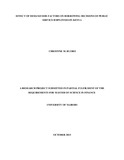| dc.description.abstract | Access to finance is necessary in order to reduce income inequality and enable low-income
households to escape from poverty. It leads to sustainable economic growth. This study therefore
sought to determine the effect of demand side factors on borrowing decisions of public Service
employees in Kenya. The variables examined were age, gender, level of education, number of
financial dependants and level of income. The target population was employees of 262 state
corporations spread across 18 ministries in Kenya. The sample for the study was 162 employees;
9 employees drawn from different state corporations under each of the 18 ministries. The study
used primary data obtained through the use of semi-structured questionnaires. There were 97
respondents implying a 60% response rate. Regression, correlation and descriptive analysis of
the data were conducted. All analyses were carried out at 5% level of significance. The study
established that 78% of the respondents have taken a loan whereas 22% of the respondents have
not taken a loan in the last three years. Age had a negative but insignificant effect on borrowing
with a bigger percentage of young employees in the age bracket 21 – 40 years borrowing more
compared to their elder colleagues in the age bracket 41-60 years. Gender had a negative but
insignificant effect on borrowing with male employees borrowing more than their female
collogues. The level of education had a positive but insignificant effect on borrowing with the
employees having higher academic qualifications borrowing more. The variables with a positive
and very significant effect on borrowing were number of financial dependants and level of
income. Employees with more financial dependants and earning high income had borrowed the
most in the last three years. This study concludes that number of financial dependants and level
of income have a significant positive effect on the borrowing decision of public service
employees. Age and gender have a negative insignificant effect, while level of education had a
positive insignificant effect. The researcher recommends more emphasis to be put on developing
a competitive remuneration package for the public sector employees since salary has a
significant effect on demand for and access to credit, and can has a direct impact on economic
growth. | en_US |

